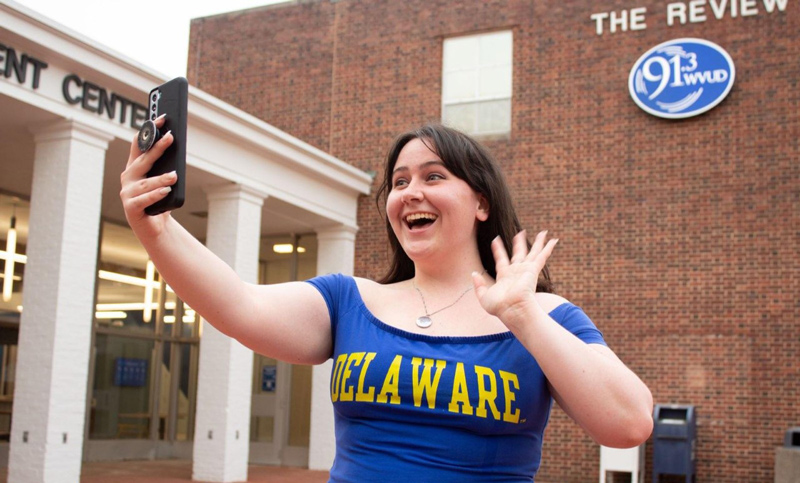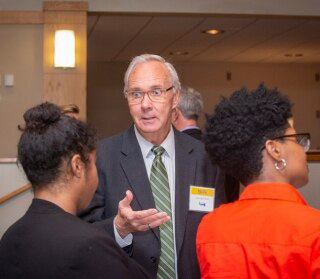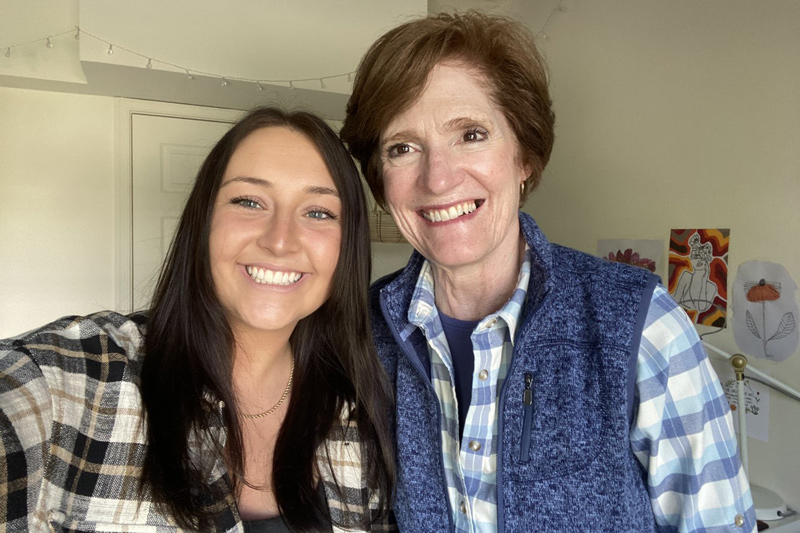


Mentors lend a hand
Photo by Wenbo Fan and courtesy of Emily Miles and Kaye Buell May 27, 2021
Alumni paired with seniors to offer academic and career guidance
When Kaye Buell celebrates her graduation from the University of Delaware on Friday, May 28, the friends and family who gather will be joined by someone who has never met any of them in person — alumnus John Gaul, who has been mentoring Buell throughout her senior year.
“He has been so enthusiastic, so supportive of my plans, and he’s had good advice for me,” said Buell, who earned her bachelor’s degree in international relations with a minor in Islamic studies and was mentored remotely during the coronavirus (COVID-19) pandemic. “I wanted to meet him now in person, and my parents wanted to meet him, so we invited him to celebrate graduation with us.”
Gaul, a lawyer who graduated from UD in 1978 with a degree in political science, was matched with Buell through the College of Arts and Sciences (CAS) Mentor Collective program, which began this academic year by pairing alumni with students in their senior year. Plans call for the program to expand, gradually adding interested juniors, as well as establishing a peer-mentoring component that would serve first- and second-year students.

The idea for the program began with members of the CAS Dean’s Advisory Council, who wanted not only to offer the college advice on policies and goals but also to launch some concrete initiatives. Several members had been involved in mentoring, informally or through other programs, and took the idea to Dean John A. Pelesko, who was enthusiastic.
“Mentoring can be a particular challenge in CAS because our college is so diverse, with so many majors and such a wide range of careers our students are considering,” Pelesko said. “When the pandemic hit, we knew our seniors would especially need support as they worried about disruptions to their academic and career plans.”
The college partnered with the Mentor Collective organization, which distributes questionnaires to interested mentors and students, provides training and then matches a mentor with one or more mentees. CAS funds the program entirely by donations.
“I’ve always wanted the college to have a mentoring program, and we’re lucky to have Dean Pelesko and an advisory council whose members want to get involved beyond our regular meetings,” said Darelle Riabov, Class of 1973 and chairperson of the Dean’s Advisory Council. “I’ve gotten to know students over the years [through UD’s Distinguished Scholars program] and stayed in touch with them as a kind of informal mentor, and I know how rewarding this kind of relationship can be — for everyone.”

For Gaul, mentoring also was nothing new. He spearheaded the CAS LP3 program, which creates a mentoring network of alumni who are practicing attorneys or law students and UD undergraduates planning a career in law, and continues his involvement in those activities. Despite a busy schedule, he is now mentoring three additional students through the new Mentor Collective program.
During his own undergraduate years, Gaul said, he was “floundering” for a time until James Magee, now the Judge Hugh M. Morris Professor Emeritus of Political Science, stepped up to mentor him.
“That was so helpful in keeping me on track to graduate and then go on to law school,” said Gaul, who practices in Philadelphia. “I wanted to pay that aspect of it forward.”
Mentoring three students who were not planning on attending law school was a new experience, he said. His first thought about Buell was: “Oh, my goodness, how am I going to be able to help this kid who’s studying international relations and Islamic studies?”
But as it turned out, Buell was interested in a possible career with the FBI, and Gaul had a contact who offered her some advice. With Buell and with his other mentees, both communications majors, he also was able to put them in touch with useful resources, review their resumes with them and help them practice or refine their job-interview skills.
Participants describe the program as helpful and confidence-boosting for students and highly rewarding for mentors.
“Every mentor has a different relationship with their mentee, depending on what works for them,” Riabov said. “But they all really feel like they’re making a difference. … For students, it’s great that they have online resources to get information about careers, but they still are going to have to go out and talk to people. That’s where a one-on-one relationship with a working adult can help them prepare.”
Her mentee, Emily Miles, who is graduating this year with a degree in communication, agreed with Riabov’s assessment of the program’s success. Both said they were amazed at how much they had in common in terms of professional interests, hobbies and personality. Because of the pandemic, they met remotely, often with twice-weekly phone calls, and both say they formed a close relationship.
“I signed up for the program because I thought it would be helpful to have my own individual resource, someone I could ask questions and get advice from, and Darelle has been great,” Miles said, adding that Riabov offered her a wealth of career-planning tips. “The connection we forged has been really special.”
Mentors in the program encourage other alumni to get involved, saying that almost everyone has more to offer a student than they might realize.
“You don’t have to have some special, high-level expertise to be a mentor,” said Jim Grimes, who graduated from UD with majors in criminal justice and economics in 1980 and is now retired from the University Police Department. He has mentored a student with an interest in criminology, not directly in law enforcement, and he said many of their interactions have involved her bouncing ideas off him and looking for feedback. He’s also been able to direct her to resources with which he’s familiar.
“Just based on your life experiences, you have knowledge to share,” Grimes said. “Helping students doesn’t require specialized knowledge or a great deal of time, but it’s very rewarding. I think the mentors learn something too.”
With pandemic restrictions easing, future mentoring might happen in person more often, but the program expects remote interactions to continue to play an important role. A Zoom or telephone call is easier to fit into both mentors’ and mentees’ busy schedules, and it allows alumni who live far away to be involved.
“What was remarkable to me was how many alumni stepped up to serve as mentors,” Pelesko said. “Some who aren’t local have been wanting to connect with us, and this has given them the opportunity to contribute in a really meaningful way.”
Contact Us
Have a UDaily story idea?
Contact us at ocm@udel.edu
Members of the press
Contact us at mediarelations@udel.edu or visit the Media Relations website

